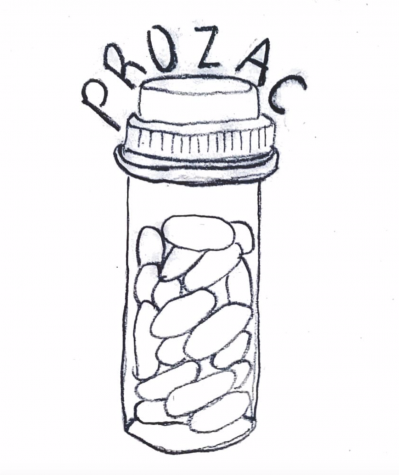A psychopharmacological revolution: the rise of antidepressants

In 1987, a new drug known as Prozac hit the market. From that moment onwards, depression would never be treated the same. With this medical breakthrough came a new wave of antidepressant drugs known as SSRIs (selective serotonin reuptake inhibitors). SSRIs are drugs that are made specifically to target one chemical in the brain, serotonin. They have significantly fewer negative side effects and a greater degree of safety than the first generation of antidepressant medications.
According to Roger Wu MD, a child and adolescent psychiatrist and an Urban parent, the positive effects of therapy and SSRIs on some depressed teenagers have been astounding. Once antidepressants are prescribed and psychological therapy is begun, mental health improvement can be seen in two to four weeks. “Now you’ve got a kid who’s sleeping again, has energy, is laughing, their appetite has stabilized and turned into something normal, they can remember all their classwork, their grades have gone back up again, they’re hanging out in the park, and they’re not talking about wanting to hurt themselves,” he said.
While the development of antidepressants has been revolutionary in the fight against mental illness, many Urban students find that they feel emotionally obstructed while on them. “[Prozac] makes me feel very numb and just disassociated from my emotions,” said an anonymous Urban student, adding that, “it also reduced my sex drive so much that I truly believed I was asexual for the past 16 or so months.”
While medication can be life-saving for individuals who struggle with depression, it is also important to note that they only address part of the problem and should be integrated with talk therapy. “I really value talk therapy as a way to address the roots of my problems that I have with depression, and I think the medication deals with the symptoms of mental illness,” said another anonymous student.
Since 1987, the usage of SSRIs has skyrocketed, a trend that is predicted to continue due to the stressful environment of quarantine according to a new study called America’s State of Mind. On the horizon for interventions are novel treatments for depression, including magnetic stimulation of the brain through the skull, the use of monitored ketamine for people feeling overwhelmingly and immediately suicidal, and developing approaches with low-dose monitored psychedelics for people suffering from Post-Traumatic Stress Disorder (PTSD).
Dr. Wu has noticed the ways in which quarantine has been catastrophic for the mental health of many teenagers. “That degree of isolation and being away from other people and having a kind of free-running circadian rhythm and also not having a sense of moving forward has lead to the highest number of psychotic and depressed kids that my peer group of physicians, as child psychiatrists in the city, has ever seen at one time,” he said.
An anonymous Urban student has deeply felt the psychological effects of isolation in quarantine. “This has been the hardest year for me mentally ever,” they said, adding that “it was hard for me to wake up every morning. I was so depressed that I didn’t brush my teeth for like three months.”
While, overall, quarantine has been incredibly difficult, the time has also helped numerous Urban students to gain perspective. “Quarantine has helped me get over my depression because I realized I had to live for myself and make memories and do things that make me happy and that it’s not worth just being sad all the time,” said an anonymous Urban student.
During this jarring time, it’s essential to take time for yourself and reach out for help when necessary. To stay mentally healthy, Dr. Wu recommends staying engaged, proper sleep, exercise, and sunshine. “Just going out in the broad daylight and doing basic exercise, and by basic, I mean walking around four blocks, has been shown to have a positive impact on mood,” he said. However, for students struggling with more than mild depression, and for anyone who has suicidal feelings or thoughts, he recommends reaching out for help.
“Everyone has mental health issues,” said one student. “In my opinion, everyone in the whole world should have a therapist. Making a decision to speak up and say that you need support doesn’t mean you’re weak, it means you’re strong.”
